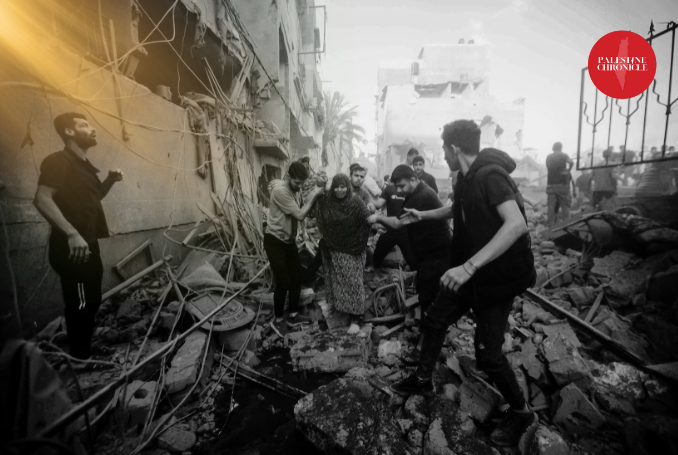Letters from Gaza – ‘Alhamdulillah. We Are Not Okay’

Israel continued to carry out massacres in Gaza. (Photo: Mahmoud Ajjour, The Palestine Chronicle)
Over the past 14 months, I have received hundreds of messages from family members throughout the Gaza Strip. The nature of the messages often conveyed a sense of urgency and panic but, at times, contentment in God’s will.
Some of those who wrote these notes have been killed in Israeli strikes, like my sister, Dr. Soma Baroud; others lost children, siblings, cousins, neighbors and friends. It may seem strange that none of those who communicated with me throughout the war have ever questioned their faith, and have often, if not always, begun their messages by checking on me, and my children.
The samples of the messages below have been edited for length and clarity.
Ibrahim:
“How are you? We are all fine. We had to leave Shati (refugee camp). The Israelis arrived at the camp yesterday. Our whole neighborhood has been destroyed. Our home, too, was destroyed. Alhamdulillah – praise be to God.”
Soma:
“How are you? And how are the kids? Times like these make me realize that no material wealth matters. Only the love of one’s family and community matters most. We had to flee Qarara (east of Khan Yunis, in southern Gaza); the boys fled further south, and I am in Deir Al-Balah with my daughter and grandson. I don’t know what happened to H (her husband). The army bulldozers began destroying the neighborhood while we were still inside. We ran away in the middle of the night.”
A’esha:
“E (her husband) was killed on the first day of the invasion. A (her son) disappeared after he learned that his father was killed. He said he wanted to avenge his father. I am worried. I don’t know what to do.”
Salwa:
“Cousin, A’esha’s son, A, was killed (he was 19). He was fighting in Jabaliya. She is somewhere in Rafah with her surviving kids. Her newborn has a congenital heart defect. Do you know of any charity that can help her? She lives in a tent without food or water.”
Ibrahim:
“We escaped the Al-Shifa (hospital in Gaza City). Then, the Israelis invaded. They took all the men outside and had us stand in line. They spared me. I don’t know why. All the men were executed. Nasser’s son (his nephew) was killed in front of me. We are still trapped at Al-Shifa.”
Soma:
“My husband was killed, brother. That poor soul had no chance. His illness had prevented him from running away on time. Someone says he saw his body after he was shot by a drone. He was hit in the head. But when we went back to the place, we couldn’t find him. There was a massive heap of rubble and garbage. We dug and dug day and night, to no avail. I just want to give him a proper burial.”
A’esha:
“Did Salwa message you about the charity? My baby is dying. I named her Wafa’ after her auntie (26, who was killed in the first few weeks of the war along with her son Zaid, 5 and husband, Mohammed in Gaza City). She can barely breathe. Some people are allowed to leave Gaza through Rafah. They say the UAE accepts some of the wounded and sick. Please help me.”
Walid:
“Have you heard anything about the ceasefire? We ran away back to the center of Gaza, after we were forced to flee south. They (the Israeli army) said ‘Go to the safe zones.’ Then, they killed the displaced inside their tents. I saw my neighbors burning alive. I am too old (he is 75). Please tell me that the war is about to end.”
Ibrahim:
“How are you, cousin? I just wanted to tell you that Nasser (his brother) was killed. He was standing in line waiting for a loaf of bread in Zeitoun. After the martyrdom of his sons, he became responsible for the grandchildren as well. They (the Israelis) bombed the crowd as they waited for the aid trucks. The explosion severed his arm. He bled to death.”
Soma:
“I was in Nuseirat when the massacre happened. (278 people were killed and over 800 wounded on June 8). I walked through the area not knowing the extent of the bloodbath. I was on my way back to Qarara to check on the kids. Bodies were strewn everywhere. They were mostly mutilated, though some were still groaning, desperately grasping onto life. I wanted to help, but I could do nothing. I kept walking from one body to the next, holding hands and looking into dying eyes. I worked in the emergency room for many years. But at that moment I felt helpless. I felt that I, too, had died on that day.”
(Dr. Soma was killed in an Israeli strike targeting her car on October 9. She had just left the hospital, where she worked, to check on her sons.)
Ibrahim:
“My condolences, cousin, for the martyrdom of your sister. She will always remain the pride of our family.”
A’esha:
“Wafa’ died this morning in our tent in Al-Musawi. There was no medicine. No food. No milk. My only solace is that she is now an angel in Paradise.”
Walid:
“How are you, cousin? We are okay. We lost everything, but we are still standing. Alhamdulillah. Do you know when the war will be over? Maybe another week, or two? I am just too old, and so, so tired.”
– Ramzy Baroud is a journalist and the Editor of The Palestine Chronicle. He is the author of six books. His latest book, co-edited with Ilan Pappé, is “Our Vision for Liberation: Engaged Palestinian Leaders and Intellectuals Speak out”. Dr. Baroud is a Non-resident Senior Research Fellow at the Center for Islam and Global Affairs (CIGA). His website is www.ramzybaroud.net.










































0 Comments